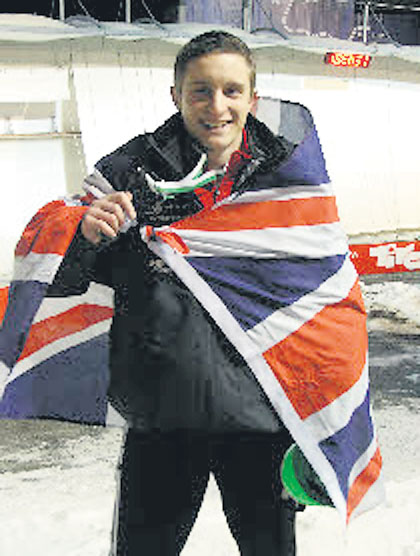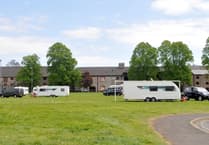It has been a busy year for Great Britain bob skeleton team member David Swift.
In April, Swift, from Newton Abbot, was funded to live in Bath for six months in order for him to undertake full-time training. Although his accommodation and bills were paid for, he still needed to put some shifts in at a local supermarket to pay for his everyday expenses.
Like many Olympic sports, the modern thinking is to keep all athletes in one location so that they can train together, this system certainly paid off in Beijing.
His regime was to train for five hours a day six, days a week. This training was broken up into dynamic training in the morning – speed work on the track or practice at the purpose-built push start track, while the afternoon was mainly weight training in the gym at the university.
Not forgetting his roots during this time, he did manage to get away for two days to compete for Newton Abbot Athletics Club, his time of 10.8s for 100m showed that his training was going well.
This rigorous training was broken up by other forms of team-building exercises such as a week with the lifeguards in north Devon.
Swift has a total five coaches. The summer period is mainly taken up by training with his strength and conditioning coach with added input from his sprint coach. However, his nutritionist and psychological coach also worked with him during the summer. His fifth one is his ice coach, who normally works with him when he is training on the ice and when he is travelling around on the circuit.
During the summer months, his ice coach arranged two training periods in Europe – one in Germany and another in Italy. These locations have a building known as an ice house which is kept below freezing. They contain a track which represents the first part of the bob skeleton run.
Swift trains on a similar track at Bath, but there it is outside and is only representative of the actual thing. In Europe these ice house tracks are very realistic.
In early October, the full squad departed for Norway for three weeks. The first ten days were spent training on the full track at Lillehammer. This was followed by a selection race. They then moved on to Italy for more training and another selection race.
At the end of the selection races Swift was seeded sixth in the men's squad. This was not as good as he had hoped for but this was partly put down to a problem with his sled, which he now hopes has been sorted out.
He is still one of six who will be chosen to form the three-man Great Britain Olympic team for the Winter Olympic Games in Vancouver in February 2010. The final team will be selected next Christmas.
'As he was originally selected to train towards the Olympic Games to be held in Russia in 2014, David knows he has done well but that is never good enough for him as he is always pushing to be the best,' said one of his coaches.
'A large part of bob skeleton is learning the tracks and the best way to drive them.
'Although David has a very fast start, he still has a great deal to learn about the tracks. The other five team members he is up against in the Great Britain squad all have many years more experience than he has. However, he has maintained his position in the second tier competition called the Intercontinental Cup.'
The Intercontinental Cup is made up of eight races – four in Europe after Christmas and four in North America before Christmas.
So after three weeks at home, Swift departed for Canada on November 23. The first race was in Calgary.
He then travels down to Salt Lake City, USA and compete in two races. The final race before Christmas is at Lake Placid, New York, after which he returns to the UK on December 21.
His own reports of the races and how he gets on can be followed on his website http://www.swiftslider.co.uk">www.swiftslider.co.uk.




